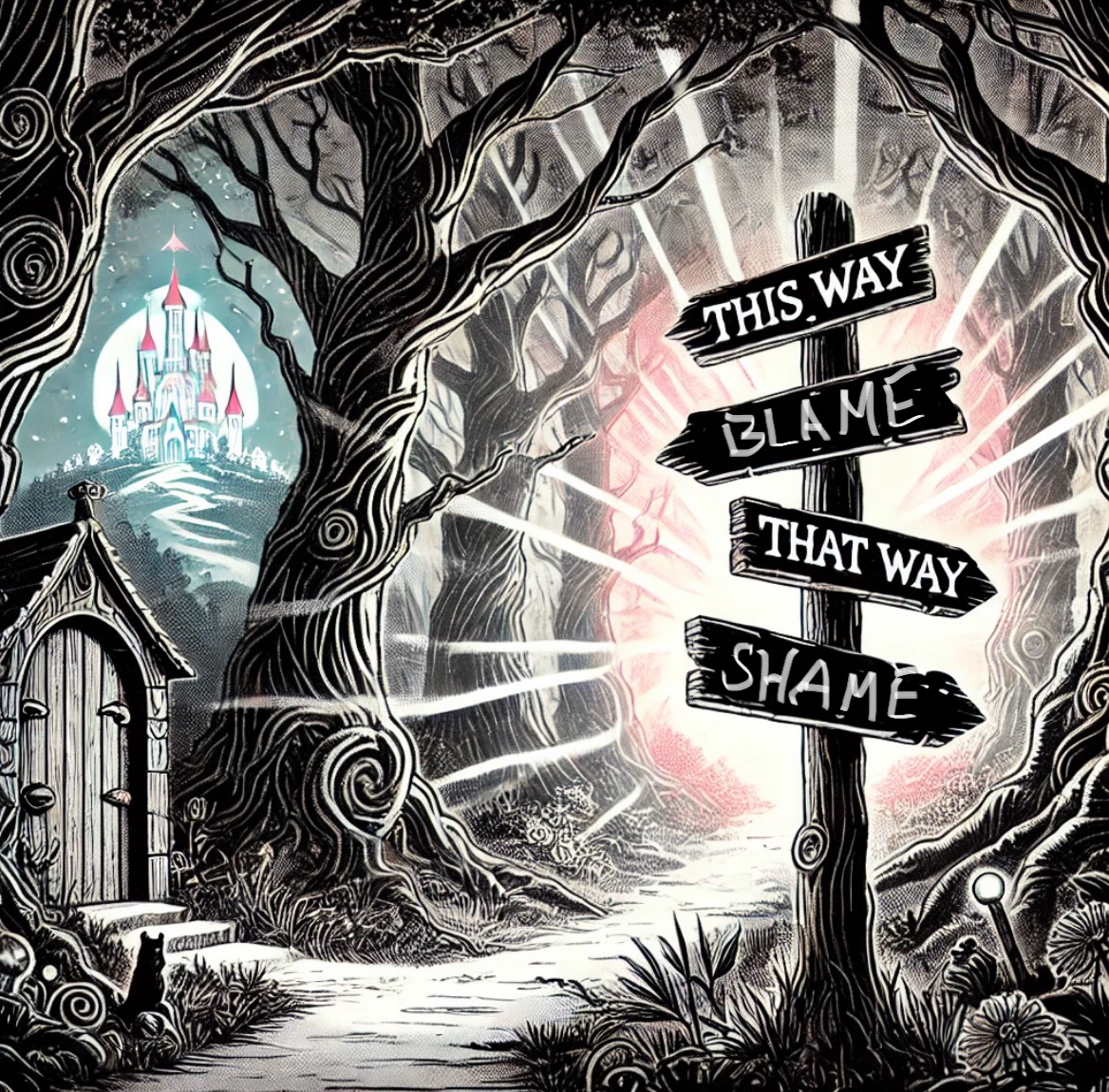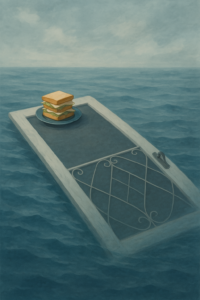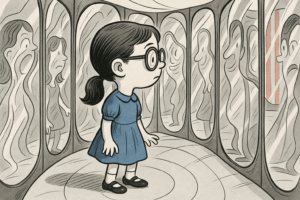Was It Abuse?
I ask myself this every day.
Was it really abuse?
Am I making it a bigger deal than it was?
Was he just… emotionally immature? Detached? Depressed? Difficult? Aggressively defensive of his time? Combative? Really into being right no matter what? On the spectrum?
Or am I just being dramatic? Am I playing the victim?
For a long time, I didn’t call it abuse because Jon didn’t yell at me. He didn’t hit me. He didn’t call me names or throw things across the room. In fact, he rarely said anything at all.
So how could it be abuse?
It took me a long time to understand that emotional abuse doesn’t always look like rage. Sometimes it looks like nothing. Like silence. Like someone disappearing into a two-hour shower or hiding in the bathroom for an hour when you’re in crisis. Like someone talking over you until you stop trying to explain yourself. Like someone refusing to help, refusing to show up, refusing to partner with you in your own life—and then somehow making you feel like the problem.
Jon never screamed at me. But he made me feel small. He made me question my needs. He controlled the dynamic by doing nothing. And somehow, over time, I found myself carrying all of it—physically, emotionally, financially. And when I finally reacted, I was the crazy one. I was the nag. I was the one with “issues.”
That’s the insidious part of emotional abuse—it twists your reality slowly, until you’re no longer sure what’s real. And that’s what I’m only now starting to understand.
If someone over the course of time is cutting you down, gaslighting you or manipulating your reality with the intent to control you, that is emotional abuse. It was a pattern of exerting power. It’s about the other personal dismissing your sense of reality over and over again. This diminishes your sense of safety, your sense of worth. Not through yelling or hitting, but through neglect, deflection, blame-shifting, minimization, guilt-tripping, and passive-aggressive control.
I Thought I Was Helping Him
I told myself he was wounded. He had a rough childhood. His parents were controlling and emotionally unavailable. His mom was checked out, his dad was bombastic. He grew up in a rigid religious environment that suffocated him. He never felt heard. Never had autonomy. Of course he was emotionally withdrawn. Of course he avoided conflict. Of course he needed space.
I understood him. I had compassion for him.
But somewhere in all that understanding, I completely lost myself. I took on neglect for his comfort.
I took on his pain. I made space for his trauma. I made excuses for his behavior. And I didn’t realize that what I was really doing was reenacting my childhood—where I had to do the same thing for my mom. I made excuses for her so I could feel safe. So I could pretend everything was okay. So I could have some sense of control in a world that didn’t feel safe.
It was never about excusing abuse. It was about survival.
It Didn’t Feel Like Abuse—Until It Did
It started as resentment. Then confusion. Then exhaustion and a loss of self. At the end it was not wanting to be intimate and being scared of him.
It wasn’t until I looked back that I realized how much I had shrunk.
How much I had stopped asking for help.
How much I stopped trusting my own perception.
How little joy I felt in my body.
How I never wanted to be touched.
How I started feeling like a shell.
Abuse doesn’t always announce itself with bruises. Sometimes it builds in quiet, invisible layers until you’re buried underneath them. And the most painful part is that you keep wondering if it’s real.
Even now, I find myself trying to make sense of it all.
Was he abusive to his coworkers? His parents?
Or just to me, because I was the closest?
Because I was the one who mirrored his wounds?
And that’s when I realized—I don’t need to prove it to anyone. I don’t need him to agree. I don’t need the internet to vote. I know how I felt. I know what it did to my nervous system, my self-worth, my ability to function.
Emotional Abuse Is Real—and It’s Subtle
1. It often hides in silence, avoidance, manipulation, or refusal to engage. It’s when:
• Someone avoids responsibility by hiding, disappearing, or stalling (like Jon and his two-hour showers or endless toilet escapes).
• Their needs are always more important than yours and they expect you to accept that, too.
• They create a dynamic where you’re always the one reacting, apologizing, fixing, or carrying the weight.
• You begin questioning your own perception, needs, or worth.
• You’re met with indifference, stonewalling, or strategic conflict that wears you down emotionally and mentally and to avoid any connection.
2.. It’s Not About a Single Moment—It’s the Accumulation
It’s the “syrup effect”—the slow drip of feeling worse, smaller, more confused, more tired, less like yourself. THAT’S how emotional abuse works.
And yes, Jon likely wasn’t abusive to everyone. Often, emotionally abusive people save their worst behavior for the people closest to them—the ones who threaten their sense of control, vulnerability, or identity. I became his emotional mirror, and he couldn’t handle it. So he withdrew, deflected and manipulated to maintain control while also shaming me into intimacy.
3. Understanding His Trauma Doesn’t Excuse His Behavior
His strict, emotionally unavailable parents, the religious trauma, the rejection, the control. All of that gives context to why Jon behaved the way he did. But it doesn’t excuse how he treated me.
He had a choice. He could have worked on himself. He could have shown up. He didn’t. He even said to me in one counseling session “If you are upset at how I treated you, you should blame my parents”. That is not even in the same galaxy as accountability.
Understanding someone’s pain is not the same as accepting mistreatment. Compassion can coexist with boundaries. However, true intimacy cannot exist where there is a hierarchy or control. And that’s what I was fighting. I wanted equality and he did not.
4. You Don’t Need to “Prove” It
“I don’t want to be a victim.”
I’m not a victim. I was a part of a dynamic that started in childhood. This dynamic has essentially lasted over 40 years. And now, I’m finally undoing that conditioning. I didn’t want to accept the truth. But now I am. Part of it was defining it as abuse and the other side of that is the aftermath and the emotional fallout to finally getting away from these toxic environments.
Naming It Is Part of Healing
I didn’t want to call it abuse because I didn’t want to be a victim.
But I’ve learned that naming it isn’t about victimhood. It’s about truth.
It’s about allowing myself to say:
What happened to me wasn’t okay.
I didn’t deserve that.
I’m not crazy for being hurt.
I’m not too much.
I wasn’t asking for too much.
If you’re reading this and still asking yourself “Was it abuse?”—
If you keep explaining his childhood or telling yourself he’s just wired differently or maybe you were just being annoying—
Please stop.
Look at how you feel. Look at how your body responds. Look at who you’ve become in the process.
That’s the truth.
And it deserves to be named so you can start healing.



